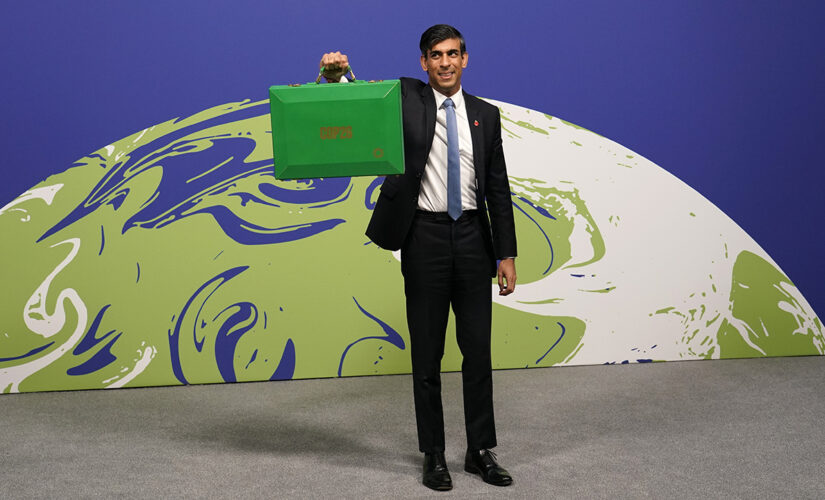Britain called Wednesday for the world’s financial industry to channel its vast funds toward greener investments to ensure that global efforts to curb global warming succeed.
Treasury chief Rishi Sunak said that while the U.K. government is providing fresh financing to help poor countries cope with climate change, “public investment alone isn’t enough.”
Speaking at the U.N. climate summit in the Scottish city of Glasgow, Sunak said U.K. financial institutions and publicly traded companies will be required to publish plans detailing how green their investments and their own businesses are — in order to ensure they’re actually contributing to reductions in global warming.
NASA STUDY: CLIMATE CHANGE IMPACT ON WORLD’S CROPS EXPECTED WITHIN NEXT DECADE
Britain’s Chancellor of the Exchequer Rishi Sunak makes a speech at the COP26 U.N. Climate Summit in Glasgow, Scotland, on Wednesday.
(AP Photo/Alberto Pezzal)
As home to the City of London, one of the world’s major financial centers, the U.K. “has a responsibility to lead the way” in financing those and other efforts to fight global warming, said Sunak.
The push for greener investments also represents a major opportunity. The measure is part of a plan that aims to create “the world’s first net-zero aligned financial center” to meet the demands of those seeking to profit from the drive toward a low-carbon economy, Sunak said.
Scores of countries, including Britain, have announced plans to cut their greenhouse gas emissions to “net zero” in coming decades to help curb manmade climate change.
A wind farm can be seen in the distance at the COP26 U.N. Climate Summit in Glasgow, Scotland, on Wednesday, Nov. 3, 2021.
(AP Photo/Alastair Grant)
Cities, states and companies have also embraced the goal, which means limiting greenhouse gas emissions to the amount that can be absorbed again through natural or artificial means. Experts caution that there are various ways to calculate “net zero” — and deciding on one standard definition is one of the big challenges going forward.
Sunak called for a “historic wall of capital” to help countries, companies and cities meet their net-zero goals — but poor nations have noted angrily that Britain and other wealthy countries failed to meet their commitment to provide $100 billion a year to finance climate-related projects in the developing world by 2020.
That target is now expected to be met in 2023.
U.S. Treasury Secretary Janet Yellen described climate change as both a huge financial challenge, with a price tag of $100 trillion, and “the greatest economic opportunity of our time.”
U.S. Treasure Secretary Janet Yellen makes a speech at the COP26 U.N. Climate Summit in Glasgow, Scotland, on Wednesday, Nov. 3.
(AP Photo/Alberto Pezzali)
CLICK HERE TO GET THE FOX NEWS APP
“Many renewables are now cheaper than carbon-based fuel alternatives and have lower long-term operating costs,” she said. “In many cases, it’s simply cost effective to go green.”
U.S. President Biden issued an executive order earlier this year aimed at requiring companies to disclose climate-related financial risks.




